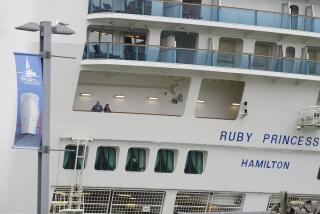Drop in cruise ships’ reported crimes raises questions
- Share via
Two years after Congress passed legislation to improve passenger safety aboard cruise ships, crime victims and other supporters of the law say key provisions are being watered down — including the mandatory reporting of crimes and how crew members are trained to handle them.
The Cruise Vessel Security and Safety Act of 2010 was designed to give passengers a more accurate picture of shipboard crime and assistance if they became victims of assault, rape or theft.
But since the law’s hard-fought passage, reported crimes disclosed to the public have plummeted from more than 400 a year to a few dozen, dramatically understating the number of deaths and sexual assaults and other crimes on cruise ships.
“The law was supposed to give victims some rights, but this does exactly the opposite of its intent,” said Kendall Carver, president of the International Cruise Victims Assn. “It’s far worse that it ever was. Lines are now using this law to say how safe they are.”
A subtle change in the law’s wording — requested by the FBI andU.S. Coast Guard and inserted by the Senate Commerce Committee staff — allowed the agencies to release to the public only the number of closed cases no longer under investigation.
This change runs counter to the common practice of law enforcement agencies across the nation, which disclose the number of reported crimes in their jurisdictions whether there is an investigation or not.
Ross Klein, a professor at Memorial University of Newfoundland who has studied cruise lines for 20 years, noted that between Oct. 1, 2007, and September 2008, the industry provided 421 crime reports to the FBI that were made public.
Under a Freedom of Information Act request filed after the law was passed, Klein received heavily redacted records that contained only a handful of reported offenses.
“While this absence of data may serve the interest of the cruise lines, which prefer the incidence of crime to remain hidden, it is not in the interest of the public or in the spirit of the Cruise Vessel Security and Safety Act of 2010,” Klein told a Senate committee in March.
FBI and Coast Guard officials declined to comment, saying they are prohibited from discussing any information the agency might have provided to the legislative review process.
As originally written by Sen. John Kerry, (D-Mass.) and Rep. Doris Matsui (D-Sacramento), the law contained no restrictions on the public disclosure of crime statistics.
During the legislative process, the FBI and Coast Guard sought the wording change, fearing that public disclosure might jeopardize ongoing investigations and endanger lives, said Whitney Smith, Kerry’s spokeswoman.
Though stakeholders were notified of the revision, Smith said, no one seemed to notice the new wording or understand the effect it would have on crime reporting.
Cruise industry officials said they were not involved in the change and asserted that the law is working as intended. Ship operators are complying with the act and continue to report crimes, said David Peikin, director of public affairs for the Cruise Lines International Assn. Congressional hearings, he added, have indicated that crime aboard cruise vessels is extremely rare.
Coast Guard officials also have said that good progress has been made implementing the law, which mandates a wide array of safety and security improvements for ships that call at U.S. ports, carry U.S. citizens or are owned by U.S. interests.
The industry handled about 11 million passengers from North America in 2010, and major cruise lines regularly call at or operate out of the ports of Los Angeles and Long Beach.
Besides the crime reporting and crew training provisions, the other requirements include higher balcony rails for cabins, more video surveillance and limits on crew access to passenger areas. Medical staff must be trained and equipped to perform rape examinations, and crew members must provide passengers with timely access to law enforcement and guidelines that instruct them how to report crimes.
Kerry and Matsui said, however, that the disclosure requirement has fallen short and vowed to increase public access to reported crimes aboard ship.
“Sen. Kerry will continue to work with his colleagues on the Commerce Committee to push for even stronger transparency and reporting measures,” Smith said. “We are concerned that the crime disclosure requirements did not go far enough.”
Both lawmakers also said they would continue monitoring how cruise lines train crew members to secure crime scenes, another area in which critics say the spirit of the legislation is not being followed.
The safety and security act requires that at least one crew member per ship be trained in security measures, preserving crime scenes, protecting evidence and assisting crime victims. To ensure that cruise lines comply with the training provisions, the Coast Guard periodically checks ships when they call on U.S. ports.
The current course is eight hours long and devotes 31/2 hours to crime scenes, evidence and documenting reported crimes. Crew members are tested after taking the course, which can be taken online or in person with an instructor.
Though the FBI has said the training time is adequate to protect crime scenes for investigations, the International Cruise Victims Assn., which has consulted with law enforcement experts, recommends 40 hours of training.
“It’s like nothing is getting accomplished,” said Laurie Dishman, 41, of Sacramento, who reported being raped by a crewman during a Royal Caribbean cruise in 2006 and told by the ship’s doctor to collect her own evidence in two gray garbage bags. “We hope lawmakers will help us restore the intent of the law.”
In Dishman’s case, she said her cabin was never secured and the crime scene became contaminated by visitors and a janitor who cleaned the room before any investigation could begin.
By the time FBI agents reached the ship five days after she reported the alleged rape, the crewman in question had been fired and sent home to Trinidad. Although Dishman had bruises in the shape of fingers around her neck and other physical signs of rape, charges were never filed because of insufficient evidence.
“Nothing was professional,” she said.
Matsui, who co-sponsored the legislation after meeting Dishman, questions allowing the cruise line industry — rather than the Coast Guard or an independent auditor — to be overseeing the training and certification of crew members.
“Like all legislation,” she added, “we need to remain constantly vigilant that the intent of the law does not get unintentionally circumvented through its implementation.”
More to Read
Sign up for Essential California
The most important California stories and recommendations in your inbox every morning.
You may occasionally receive promotional content from the Los Angeles Times.










